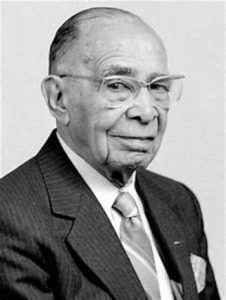
W. Montaque Cobb
*W. Montaque Cobb was born on this date in 1903. He was a Black educator and professor of anatomy.
William Montague Cobb was born in Washington, D.C. Cobb grew up pondering the question of race, which ultimately led him to his anthropology studies. He graduated from Dunbar High School and continued his studies at Amherst College, where he studied various subjects and graduated with a Bachelor of Arts degree. After Amherst, Cobb researched embryology at the Woods Hole Marine Biology Laboratory in Massachusetts. Cobb next attended Howard University Medical School, earning a Master's Degree in 1929.
For the next few years, Cobb spent his time at Case Western Reserve University, where he earned a Ph.D. and worked on the Hamann-Todd Skeletal Collection. He returned to Howard University in 1932 and began working in his own laboratory to conduct skeletal research. During the summers, he also continued his research on the human craniofacial union at the Hamann-Todd Collection and the Smithsonian Institute.
Cobb’s two best papers on this subject were The Cranio-Facial Union and the Maxillary Tuber in Mammals (1943) and Cranio-Facial Union in Man (1940). As the only Black physical anthropologist with a Ph.D. before the Korean War, Cobb held the only Black perspective on physical anthropology for many years.
He served as the Chairman of the Anthropology Section of the American Association for Advancement of Science and was the first Black President of the American Association of Physical Anthropologists. However, Cobb was not only a famous physical anthropologist because of his race but also because of the great contributions he made to the field of anthropology. He also chronicled the history of Blacks in medicine. Dr. Cobb served on the Executive Committee of the White House Conference on Health in 1965. In 1978 he received the U.S. Navy Distinguished Public Service Award and was the 1980 recipient of the Henry Gray Award, the highest honor bestowed by the American Association of Anatomists.
His publications established him as a functional anatomist. Cobb also made significant contributions to the issue of race in athletics, where he claimed race was insignificant to athletics. He also profiled the biology and demography of the African American race during the 1930s.
He is best known for his research in physical anthropology, the growth and development of the Black, and aging in the adult skeleton. With his death on November 20, 1990, Cobb left his legacy of skeletal research with the Laboratory of Anatomy and Physical Anthropology at Howard University. This collection of over 600 skeletons is considered one of the premier collections of its kind.
I.E. and Harrison, F. V. (Ed.). (1999).
African American Pioneers in Anthropology.
Chicago: University of Illinois Press.
Cobb, W. Montague. (1997).
The African American Almanac. (7th ed.).
Detroit: Gale Research, Inc.